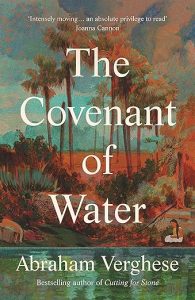Title: The Covenant of Water
Author: Abraham Verghese
Contributor: Deidre Mulkerin, IPAA Queensland President, Department of Child Safety, Seniors and Disability Services. Prior to this she was Director-General of the Department of Children, Youth Justice and Multicultural Affairs
The Covenant of Water follows a family in southern India from the early 1900s. At least one person dies by drowning in each generation. It is a story of family, loss and the impact of loss across generations. It is beautifully written – my favourite quote is All water is connected and only land and people are discontinuous.
About the Book: Spanning the years 1900 to 1977, The Covenant of Water follows a family in southern India that suffers a peculiar affliction: in every generation, at least one person dies by drowning – and in Kerala, water is everywhere. At the turn of the century a twelve-year-old girl, grieving the death of her father, is sent by boat to her wedding, where she will meet her forty-year-old husband for the first time. From this poignant beginning, the young girl and future matriarch – known as Big Ammachi – will witness unthinkable changes at home and at large over the span of her extraordinary life, full of the joys and trials of love and the struggles of hardship. A shimmering evocation of a lost India and of the passage of time itself, The Covenant of Water is a hymn to progress in medicine and to human understanding, and a humbling testament to the hardships undergone by past generations for the sake of those alive today. Imbued with humour, deep emotion and the essence of life, it is one of the most masterful literary novels published in recent years.
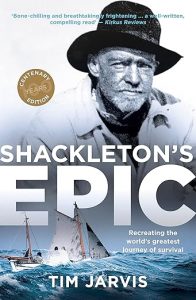
Title: Shackleton’s Epic: Recreating the World’s Greatest Journey of Survival
Author: Tim Jarvis
Contributor: Tanya Hornick, IPAA Queensland Secretary and Vice-President, Strategic Partnership Manager (Queensland), Australian Bureau of Statistics
An incredible adventure memoir in which Tim Jarvis describes the highs and lows in his quest to retrace and recreate Shackleton’s epic journey to survival from Antarctica to South Georgia. A compelling read that underscores the importance of optimism in the face of adversity.
About the Book: Modern-day journey to retrace, for the first time ever, the legendary 1916 survival journey of Sir Ernest Shackleton – sailing a replica James Caird boat 1500kms across the Southern Ocean from Elephant Island, Antarctica to South Georgia and climbing over South Georgia’s mountainous interior using the same rudimentary equipment, period clothing and technology as Shackleton. The original journey was described by Sir Edmund Hillary as “the greatest survival journey of all time”.
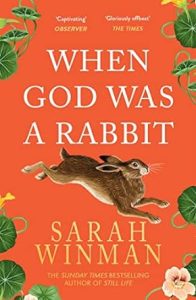
Title: When God was a Rabbit
Author: Sarah Winman
Contributor: Rachel Hunter, IPAA Queensland Council Member, Director-General, Department of the Premier and Cabinet
A story of family, love, tragedy and dark humour.
About the Book: Spanning four decades, from 1968 onwards, this is the story of a fabulous but flawed family and the slew of ordinary and extraordinary incidents that shape their everyday lives. It is a story about childhood and growing up, loss of innocence, eccentricity, familial ties and friendships, love and life. Stripped down to its bare bones, it’s about the unbreakable bond between a brother and sister.
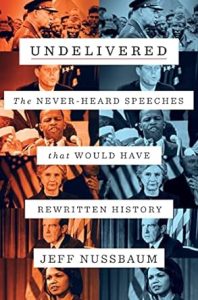
Title: Undelivered: The Never-Heard Speeches That Would Have Rewritten History
Author: Jeff Nussbaum
Contributor: Graham Fraine, IPAA Queensland Council Member, Chief Executive Officer, Brisbane 2032 Coordination Office
For anyone interested in history and sliding door moments, a fascinating book that looks at the speeches that were written/mooted but never delivered to mark different outcomes at pivotal points in history (e.g., If Eisenhower’s D-Day invasion had not been successful, If Richard Nixon decided to remain president).
About the Book: For almost every delivered speech, there exists an undelivered opposite. These “second speeches” provide alternative histories of what could have been if not for schedule changes, changes of heart, or momentous turns of events. In Undelivered, political speechwriter Jeff Nussbaum presents the most notable speeches the public never heard, from Dwight Eisenhower’s apology for a D-Day failure to Richard Nixon’s refusal to resign the presidency, and even Hillary Clinton’s acceptance for a 2016 victory—the latter never seen until now. Examining the content of these speeches and the context of the historic moments that almost came to be, Nussbaum considers not only what they tell us about the past, but also what they can inform us about our present.
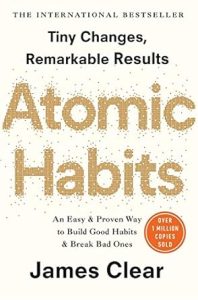
Title: Atomic Habits
Author: James Clear
Contributor: Mark Le Dieu, IPAA Queensland Council Member, Group Manager (Community Grants Hub), Department of Social Services
It claims that real change comes from the compounding effects of lots of small decisions! Easy to read/digest and I’m seeing if an Old Dog can learn new tricks (or at least change some of them)!
About the Book: Transform your life with tiny changes in behaviour, starting now. People think that when you want to change your life, you need to think big. But world-renowned habits expert James Clear has discovered another way. He knows that real change comes from the compound effect of hundreds of small decisions: doing two push-ups a day, waking up five minutes early, or holding a single short phone call. He calls them atomic habits. In this ground-breaking book, Clears reveals exactly how these minuscule changes can grow into such life-altering outcomes. He uncovers a handful of simple life hacks (the forgotten art of Habit Stacking, the unexpected power of the Two Minute Rule, or the trick to entering the Goldilocks Zone), and delves into cutting-edge psychology and neuroscience to explain why they matter. Along the way, he tells inspiring stories of Olympic gold medalists, leading CEOs, and distinguished scientists who have used the science of tiny habits to stay productive, motivated, and happy. These small changes will have a revolutionary effect on your career, your relationships, and your life.
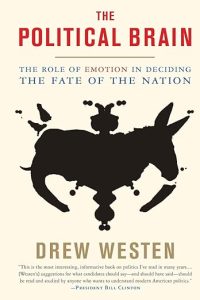
Title: The Political Brain: The Role of Emotion in Deciding the Fate of the Nation
Author: Drew Western
Contributor: Scott Prasser, IPAA Queensland Council Member, Public Policy Consultant and Commentator
With Australia’s most important referendum behind us and a forthcoming Queensland election just 12 months away. it might be worth reading over the forthcoming holiday period, what’s out there about elections and campaigning – always a fascinating topic.
About the Book: The Political Brain is a groundbreaking investigation into the role of emotion in determining the political life of the nation. For two decades Drew Westen, professor of psychology and psychiatry at Emory University, has explored a theory of the mind that differs substantially from the more “dispassionate” notions held by most cognitive psychologists, political scientists, and economists — and Democratic campaign strategists. The idea of the mind as a cool calculator that makes decisions by weighing the evidence bears no relation to how the brain actually works. When political candidates assume voters dispassionately make decisions based on “the issues,” they lose. That’s why only one Democrat has been re-elected to the presidency since Franklin Roosevelt — and only one Republican has failed in that quest. In politics, when reason and emotion collide, emotion invariably wins. Elections are decided in the marketplace of emotions, a marketplace filled with values, images, analogies, moral sentiments, and moving oratory, in which logic plays only a supporting role. Westen shows, through a whistle-stop journey through the evolution of the passionate brain and a bravura tour through fifty years of American presidential and national elections, why campaigns succeed and fail. The evidence is overwhelming that three things determine how people vote, in this order: their feelings toward the parties and their principles, their feelings toward the candidates, and, if they haven’t decided by then, their feelings toward the candidates’ policy positions. Westen turns conventional political analyses on their head, suggesting that the question for Democratic politics isn’t so much about moving to the right or the left but about moving the electorate. He shows how it can be done through examples of what candidates have said — or could have said — in debates, speeches, and ads. Westen’s discoveries could utterly transform electoral arithmetic, showing how a different view of the mind and brain leads to a different way of talking with voters about issues that have tied the tongues of Democrats for much of forty years — such as abortion, guns, taxes, and race. You can’t change the structure of the brain. But you can change the way you appeal to it. And here’s how

Title: Chasing the Scream
Author: Johann Hari
Contributor: Holly Ransom, public speaker, interviewer and leadership consultant
I’d recommend ‘Chasing the Scream’- it’s a book all about the history and criminalization of The War on Drugs. I read it earlier this year and it left we with a lot of reflective questions re: policy making.
About the Book: What if everything we’ve been told about addiction is wrong? One of Johann Hari’s earliest memories is of trying to wake up one of his relatives and not being able to. As he grew older, he realised there was addiction in his family. Confused, he set out on a three-year, thirty-thousand mile journey to discover what really causes addiction – and how to solve it. Told through a series of gripping human stories, this book was the basis of a TED talk and animation that have been viewed more than twenty million times. It has transformed the global debate about addiction.

Title: Switch: How to change things when change is hard
Author: Chip Heath and Dan Heath
Contributor: Mike Kaiser, Director-General of the Department of State Development
Simply the best book on the psychology of change I’ve ever read. Based on an unforgettable metaphor.
About the Book: Why is it so hard to make lasting changes in our companies, in our communities, and in our own lives? The primary obstacle is a conflict that’s built into our brains. Psychologists have discovered that our minds are ruled by two different systems–the rational mind and the emotional mind–that compete for control. The rational mind wants a great beach body; the emotional mind wants that Oreo cookie. The rational mind wants to change something at work; the emotional mind loves the comfort of the existing routine. This tension can doom a change effort–but if it is overcome, change can come quickly. In a compelling, story-driven narrative, the Heaths bring together decades of counterintuitive research in psychology, sociology, and other fields to shed new light on how we can effect transformative change. Switch shows that successful changes follow a pattern, a pattern you can use to make the changes that matter to you, whether your interest is in changing the world or changing your waistline. Table of contents: * Three suprises about change * Find the bright spots * Script the critical moves * Point to the destination * Find the feeling * Shrink the change * Grow your people * Tweak the environment * Build habits * Rally the herd * Keep the Switch going * How to make a Switch * Overcoming obstacles * Next steps.
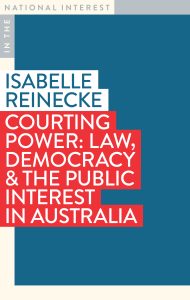
Title: Courting Power: Law, Democracy & the Public Interest in Australia
Author: Isabelle Reinecke
Contributor: Professor Susan Harris Rimmer, Director of the Griffith University Policy Innovation Hub
About the Book: Courts aren’ t just there to settle divorces, sentence law-breakers and resolve corporate disputes. A healthy legal system, one that ensures access, transparency and accountability, is fundamental to democracy. When the system works, the courts act as a check on government power, holding our politicians and bureaucrats to account.In Courting Power, Isabelle Reinecke, founder of Grata Fund, Australia’ s first strategic litigation funder and incubator, takes us through some of the public interest cases she has helped bring about– from one launched by Torres Strait Islanders to establish the federal government’ s duty of care regarding climate change, to a High Court case on remote housing rights in the Northern Territory, and Doctors for Refugees’ successful challenge to government gag laws. In a world of spin and puff, inattention and information overload, media deregulation and TikTok, evidence and accurate information have never been so important. The courts are perhaps the last remaining place where facts are primary and hyperbole is ignored. Courting Power is a timely reminder of how ordinary people can rely on them to keep the powers that be accountable.

Title: Fred Hollows – an autobiography with Peter Corrs
Author: Peter Corrs
Contributor: Samay Zhouand, The Public Trustee of Queensland
An engaging autobiography of a purpose driven and action orientated, and occasionally controversial individual who left an indelible legacy in helping to prevent eye diseases and blindness, particularly for the most vulnerable
About the Book: This book was first published in 1991, claiming it ‘replenishes the sense of what it possible’. Three decades on, it still does. This edition shows what is possible – problems encountered and overcome, breakthroughs big and small, and the spread of Fred Hollows’ work across the globe with more and more people getting modern eye care.
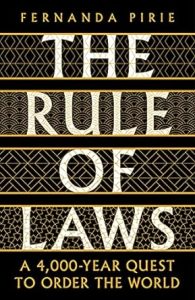
Title: The Rule of Laws: A 4000-year Quest to Order the World
Author: Fernanda Pirie
Contributor: Peter Bridgman, Barrister and Consultant
I like books that challenge how I think about the world and about policy. My background as a psychologist and lawyer heavily influence my thinking, so reading from other disciplines is good for the brain. I’m currently slow-reading books about game theory in business, a history of English royalty and the psychology of reasoning.
About the Book: From ancient Mesopotamia to today, the epic story of how humans have used laws to forge civilizations. ‘A fascinating, comprehensive study that forces us to think again about what law is, and why it matters … For those who want to understand why human society has emerged as it has, this is essential reading’ – Rana Miller, author of China’s Good War. The laws now enforced throughout the world are almost all modelled on systems developed in Europe in the eighteenth and nineteenth centuries. During two hundred years of colonial rule, Europeans exported their laws everywhere they could. But they weren’t filling a void: in many places, they displaced traditions that were already ancient when Vasco Da Gama first arrived in India. Where, then, did it all begin? And what has law been and done over the course of human history? In The Rule of Laws, pioneering anthropologist Fernanda Pirie traces the development of the world’s great legal systems – Chinese, Indian, Roman, and Islamic – and the innumerable smaller traditions they inspired.

